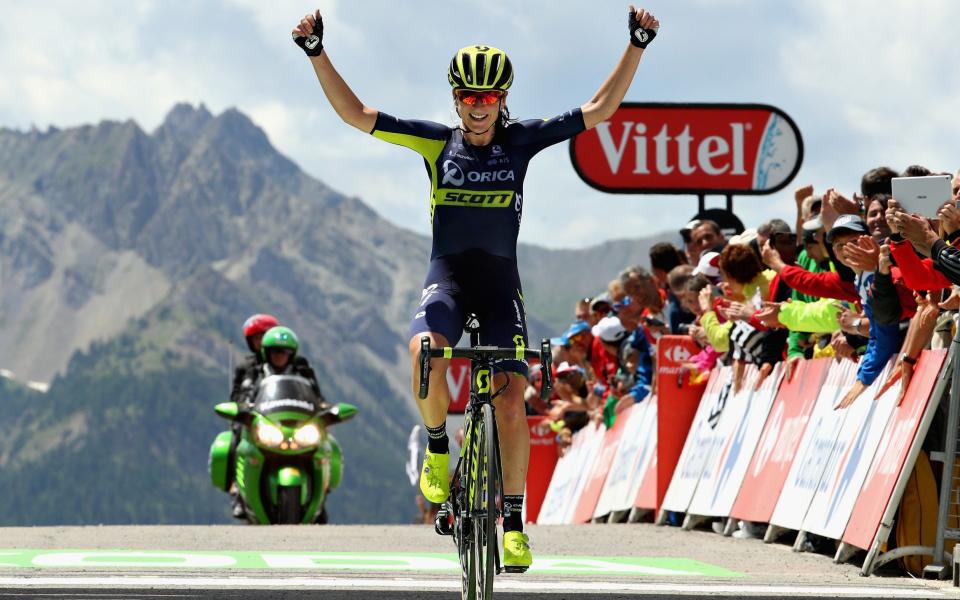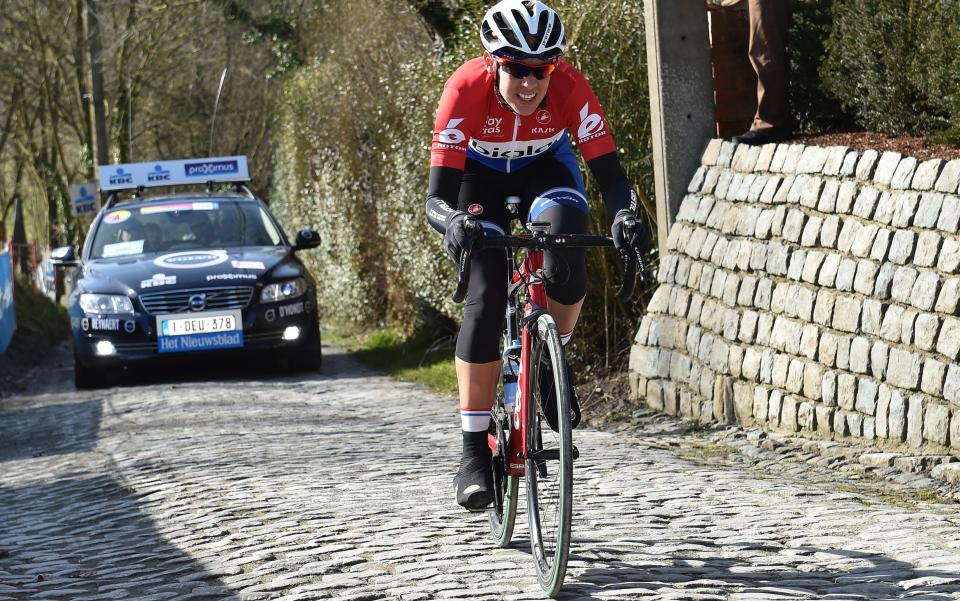Tour de France organisers failed us but finally seem to be getting the message, says campaigner

Kathryn Bertine is not someone to mince her words. The American, one of the founder members of Le Tour Entier, the pressure group which has long campaigned for a women’s Tour de France, readily describes herself as a “total pain in the a---”. She is proud of it.
Along with co-founders Marianne Vos, Emma Pooley and Chrissie Wellington, Bertine’s incessant lobbying in 2014 was instrumental in getting Amaury Sport Organisation, the Tour’s organisers, to set up La Course by Le Tour, the one-day women’s race which now runs alongside the men’s.
Six years on, though, Bertine has run out of patience.
“ASO have failed us,” she says, bluntly. “We had an understanding at the beginning that the race would grow incrementally, adding two to three days per year. ASO have not kept to our agreement. They did not grow La Course, they used shape-shifting; moving it to the Alps, adding an extra stage in 2017 – but only for the top 20 riders, which was bonkers. They failed their promise.” She pauses. “But we’re happy they seem to be finally getting the message.”
Bertine is referring to recent comments by Christian Prudhomme, the Tour’s race director, to the effect that ASO is now looking at staging a women’s race later in the summer, after the men’s race has finished. His comments gave rise to new hope that a women’s Tour de France might be in the offing. What is more, Prudhomme actually put a date on it. “The calendar for this year is now fixed,” he said. “There will be the Olympic Games next year, so 2022 makes the most sense.”
Will it happen? Could it happen? It surely has to at some point.
ASO likes to bill the Tour as the “biggest annual sporting event in the world”, behind only the Olympics and the Fifa World Cup in overall coverage. Well, as Pooley points out, “with great power comes great responsibility”. Fifa has staged a Women’s World Cup since 1991, and even the Olympics – which appeared to be stuck in Ancient Greece for much of the 20th century where equal rights were concerned – reached 45 per cent female participation at the most recent Games in Rio.
Surely ASO, as the largest most influential race organiser in cycling, will have to step up soon?
“As I said, I’m pleased ASO seems to be getting the message,” Bertine says. “But I’m nervous, too. Prudhomme is talking about 2022. But 2022 is still two years away. Are they just throwing us crumbs? Distracting us? I want to see some action.”
Bertine’s scepticism is understandable, given past efforts to get a women’s Tour de France off the ground. ASO staged a version between 1984 and 1989, and there were further efforts in the 1990s and 2000s. But none got close to achieving parity. Organisers had to scramble for sponsorship every year and the last edition of La Grande Boucle Féminine in 2009 (they could no longer call it the Women’s Tour de France due to copyright) lasted just four days and featured 66 riders.
Pooley, who won that last edition, points out there are plenty of reasons for being more optimistic now. Women’s cycling has grown to such an extent ASO can hardly ignore it. Indeed, to give it its due, ASO has played a key part in that growth. Not only has La Course provided a huge platform each year, with live television coverage, ASO launched Liège-Bastogne-Liège for women in 2017, while this year (coronavirus permitting) we will have the inaugural women’s Paris-Roubaix, another ASO-controlled property.
“I think we will get there eventually,” Pooley says. “And it will be on the same day, and it will be the same length. I’m absolutely confident of that. They have to.”
Not everyone would agree with Pooley that those would be the right calls – in terms of either timing or distance. Kasia Niewiadoma, the Canyon-Sram rider, told Telegraph Sport in 2018 that she did not feel women were capable of riding three weeks at the same distance as the men, arguing that you “cannot deceive nature” (to be fair to Niewiadoma, she had just finished a brutal edition of La Course up to Le Grand-Bornand when she said it, and she may have changed her mind since then). But if she still holds that view, she is in an increasing minority.

Iris Slappendel (pictured above racing at Omloop Het Nieuwsblad in 2015), executive director of The Cyclists’ Alliance, an organisation which advocates for women’s cycling, calls the suggestion that women could not handle the distance or the rigours of the Tour “outdated and archaic”, pointing to the recent successes of women in other endurance sports, including two ultra-endurance races which were won outright by women last year; Fiona Kolbinger in the Trans Contintental Race, an ultra-endurance, self-supported and self-navigated bike race across Europe, across 4000km, and Jasmine Paris who took home first place in the 268-mile Spine Race (running).
Pooley agrees. “You’d have to be a dinosaur to argue that women would not be physically capable of riding the same route as the men,” she says. "Whether that would be the best format for a women’s race I don’t know. Many people feel the men’s race would be more exciting with shorter stages."
Tiffany Cromwell, Niewiadoma’s team-mate, makes the point that the limiting factor is not so much physical as financial. “If you look at the men’s side, the operating budgets they run on … their Tour riders get to focus their entire seasons just on the Tour. Women’s cycling isn’t at this point yet, it doesn’t have the teams big enough to support riders to train specifically for a three-week tour.” Cromwell believes a two-week race would be right initially, building up to three.
As for whether the two races should run concurrently or separately, again opinions vary. For Pooley, it is the principle. She wants the women’s race on the same day on the same route. “You’d think it was crazy if the New York Marathon said, ‘We think it would be great to have a women’s race so we’re going to have a 10km race and it’s going to be two months later than the men’s’,” she argues. "No one would accept that in running. No one would accept that in triathlon. No one would accept it in athletics, or rowing..."
Cromwell, though, has doubts, citing not only the logistical issues of running two races at the same time, but wondering whether the men’s race would overshadow the women’s. She would prefer “a race that is 100 per cent for the women that can develop into the biggest and most important race on the calendar”.
"The Tour de France is more than 100 years old," she says. "It has history. We would have to grow the women’s race over time, but giving it its own time would mean we would be given the platform to do it, as opposed to always being a side event to the men’s race."
Whatever the race eventually looks like, the one thing they all agree on is that it must be called the 'Tour de France'. The name itself is crucial.
For Pooley, again, it is a matter of principle. "I'll be honest, I think the principle of having the same race; the same name, the same stage distances, the same duration [three weeks] is super-important," she says. "Cycling is, I think, the only sport left where there is still the myth that women cannot do the same physically as men."
Bertine agrees. “I definitely think it’s very important that the term 'Tour de France' be used," she says. "If they run it at a different time of year then I guess it makes sense to call it the ‘Women’s Tour de France'. But if we do that then we should call it the 'Men’s Tour de France', too, because otherwise it’s making one subordinate to the other. It’s one of those subtle things, but it matters.”
Ultimately, many - Slappendel included - feel it would be healthier to focus on the growth of women's cycling as a whole rather than obsess endlessly over one race in particular. They have a point. Each year, the hand-wringing over La Course - why it isn't longer, why ASO is not doing more - tends to overshadow the race itself. But there is a reason it keeps coming back to this question.
"The Tour de France has a global reputation," Cromwell concludes. "From my experience in the sport, when talking to people about what I do and saying that I’m a professional cyclist, most commonly the response has been in reference to the Tour de France. It would be nice to say. 'Yes - I’ve raced the 'Tour de France’. We already have a number of fantastic tours on the calendar but they haven't got the same kind of history and prestige as the Tour."

